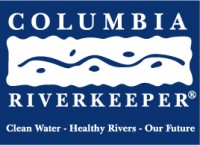Blog post by Jasmine Zimmer-Stucky, Riverkeeper's Community Organizer—
In 2012 the impacts of proposals to transform the Northwest into a corridor for US coal to be exported overseas became a top household issue. 30 neighborhoods in Portland border potential coal train routes and 46 have spoken up about coal export. The neighborhoods asked for thorough reviews of all coal export proposals in the Northwest (currently there are five) or outrightly opposed coal export.
On September 19th, 2012, the City of Portland passed a resolution opposing coal trains in Portland and requested additional studies of the complete impacts of these projects. The resolutions passed by the neighborhood associations were listed in the City resolution as a key reason to take action on this issue. Metro Council passed a similar resolution on September 20th, 2012. Multiple neighborhood association members testified in front of the City and Metro in favor of resolutions that supported evaluating the impacts of coal exports in their neighborhoods.
Ambre Energy’s Morrow Pacific coal export project is the farthest along in the permitting process. Two state agencies are considering permits for the upriver portion of this rail-to-barge coal export plan at the Port of Morrow in Boardman, Ore. These state agencies – Oregon Department of State Lands and Oregon Department of Environmental Quality – should listen to the concerns of neighborhoods that would be impacted by coal exports. Ambre Energy also submitted a draft Environmental Assessment to the Army Corps of Engineers. The Corps has yet to decide if an in-depth Environmental Impact Statement (EIS) is required. An EIS would allow for multiple phases of public input while an Environmental Assessment is a less thorough review with limited public comment.
Over 800 people attended an Oregon Department of Environmental Quality informational public hearing about Ambre Energy’s Morrow Pacific coal export project in Portland on December 6th. Many neighborhood association members were present at the hearing. As reported in The Oregonian and elsewhere, opponents of coal exports clearly outnumbered proponents of the coal terminals.
The Gateway Pacific coal export terminal proposed near Bellingham, WA began its EIS process in 2012 with a process called Scoping. Over 8,000 people attended Scoping hearings across Washington where they provided testimony about what impacts should be studied in the EIS.
In 2013, two Oregon agencies will have the opportunity to approve, deny, or continue their study of Ambre Energy’s Morrow Pacific coal export project. And, Ambre’s second proposed coal terminal in Longview, WA will likely enter into the EIS public Scoping process mid-year, triggering more opportunities for the public to weigh in. Additionally, more public hearings for Ambre Energy’s project are expected from the Oregon Department of Environmental Quality in the spring. A high level of public involvement in these hearings will remain critical to achieving a complete evaluation of the local and global impacts of coal export.
There are no significant updates on the Kinder Morgan coal export project in St. Helens or the Coos Bay proposal. To stay informed on coal export visit www.columbiariverkeeper.org and www.PowerPastCoal.org and subscribe to email alerts.
Contact: Jasmine Zimmer-Stucky, (503) 929-5950, jasmine@columbiariverkeeper.org



